Cyprus housing market remains depressed, but interest rates are falling and transactions are rising
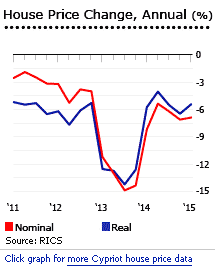 After six long years of house price falls Cyprus´ housing market is still falling, amidst a struggling economy. The market is truly depressed. But there is hope - transactions are rising, so maybe, just maybe, this is a sign that things are changing.
After six long years of house price falls Cyprus´ housing market is still falling, amidst a struggling economy. The market is truly depressed. But there is hope - transactions are rising, so maybe, just maybe, this is a sign that things are changing.
Average house prices in Cyprus fell 3.03% (-1.52% inflation-adjusted) during the year to end-Q1 2015, according to the Royal Institution of Chartered Surveyors (RICS). During the latest quarter house prices fell 0.56%.
During the year to end-Q1 2015:
- Nicosia, Cyprus’ capital, house prices declined by 6.9% (-5.45% inflation-adjusted) to an average price of €374,488 (US$416,206)
- Paphos house prices declined by 0.1% (a rise of 1.45% inflation-adjusted) to an average price of €347,743 (US$386,482)
- In Limassol, house prices declined by 3.97% (-2.47% inflation-adjusted) to an average price of €314,078 (US$349,066)
- In Farmagusta-Paralimni, house price declined by 4.36% (-2.87% inflation-adjusted) to an average price of €320,916 (US$356,666)
- In Larnaca, house prices rose by 1.54% (3.12% inflation-adjusted) to an average price of €285,725 (US$317,555)
Unsurprisingly apartment prices have followed house prices down. Limassol saw the biggest drop of all Cyprus districts, with apartment prices falling by 4.32% (-2.83% inflation-adjusted), followed by Nicosia 4.17% (-2.68% inflation-adjusted), Paphos -3.54% (-2.04% inflation-adjusted), Larnaca -2.44% (-0.92% inflation-adjusted), and Famagusta-Paralimni -1.19% (0.35% inflation-adjusted).
This across-the-board decline is largely driven by two factors: Cyprus´ weak economy has hit local consumer demand, and the tightening of lending criteria. The Cyprus real estate market has historically been divided into the major urban centres of Nicosia, Limassol and Larnaca, primarily driven by local demand; and the seaside resort areas of Paphos and Famagusta, which are mostly driven by foreign demand. The economic decline of recent years affected both.
While property sales are now gradually increasing, prices are expected to continue falling in 2015, mainly due to the country’s strict lending regime following its banking crisis, according to RICS.
“The market is affected by increased property taxes and the issue of foreclosures on mortgaged properties, preventing the market from stabilizing,” said RICS spokesman.
Cyprus´ banking crisis and the housing market crash
In 2012 Cyprus´ banking system collapsed. Like Iceland, Cyprus´ banking sector has long had a huge offshore banking sector. By 2012 the banking sector had assets of $120 billion in an economy with a GDP of only $24 billion, with $60 billion of these assets involving Russian corporations´ deposits. Cypriot banks had a hard time making a return on all this money, and their response was to raise loan risk-levels, lending to Cyprus´ own overleveraged local property companies, and to the Greek government, which in 2012 experienced the largest sovereign debt default in history.
March 2013, Cyprus became the fifth Eurozone country to get a bailout from the Troika, composed of the International Monetary Fund, European Central Bank and European Commission. Cyprus was lent €10 billion (US$13.71 billion). Included in the agreement was a haircut for bank deposits of more than €100,000 (US$137,070) at the country’s two largest banks—Bank of Cyprus, and Cyprus Popular Bank (Laiki Bank).
The terms required Cyprus to cut public sector spending, hike taxes, and cut its bloated banking sector. The loss of confidence had an enormous impact on the local economy, combined with the decline in tourism largely resulting from the Eurozone crisis, and the downgrading of the Cypriot government´s bond credit rating to junk status.
Cyprus´ high unemployment leads many to believe that the housing slump will continue. In 2014, the nationwide jobless rate reached a record 16.2%, according to the IMF.
Construction at an amazing all-time low
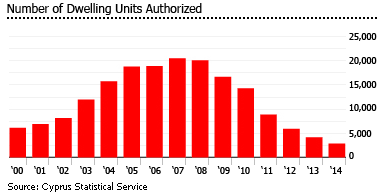
Only 2,855 dwelling units were authorized in Cyprus in 2014, a fall of 31.1% from a year earlier, according to the Cyprus Statistical Service. From an average of 18,000 units authorized annually from 2004 to 2010, dwelling permits have fallen to under 3,000 units per annum now.
Property sales way, way below pre-crisis levels
In 2014, property sales in Cyprus rose by 20.2% to 4,527 units from a year earlier. But sales remain far below the pre-crisis levels. Sales were at an average of 18,000 units in 2002-2007.
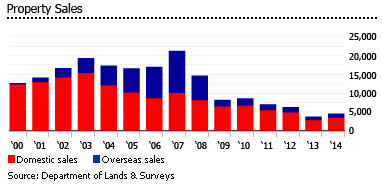
During the first five months of 2015, property sales to the domestic market rose by 6% y-o-y to 1,380 units. On the other hand, sales to the overseas market were up by a miniscule 0.2% to 504 units during the same period, based on figures from the Department of Lands & Surveys.
By major urban centres:
- Larnaca fared best in Cyprus, with total registered sales rising 35.9% to 394 units during the first five months of 2015 as compared to the same period last year.
- In Limassol, property sales rose by 13.8% y-o-y to 602 units over the same period.
- Nicosia registered 348 sales contracts in the first five months of this year, down by 6.2% a year earlier.
- In Paphos, sales contracts fell by 8.7% to 442 units over the same period.
- Famagusta was the worst performer, with only 98 contract registrations from Jan-May 2015, down 27.9% a year earlier.
“Given prevailing economic conditions and the turbulence in Cyprus’ banking system, there were few transactions during the quarter although volume was higher on a year on year basis,” said RICS. “Local buyers in particular were the most discerning as the increase in unemployment and the prospects of the local economy maintained the lack of interest.”
Brief history of Cyprus´ housing market
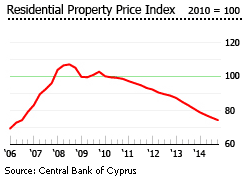
Cyprus’ housing market started to decline in 2009, mainly due to the global financial meltdown, according to the Central Bank of Cyprus (CBC), after robust house price increases of 21.13% (17.07% inflation-adjusted) in 2007 and 9.42% (5.63% inflation-adjusted) in 2008.
CBC statistics are collected separately from RICS, so the figures may differ slightly:
- In 2009, the residential property price index fell by 2.19% (-3.02% inflation-adjusted).
- In 2010, the residential property price index fell by 4.1% (-6.04% inflation-adjusted).
- In 2011, the residential property price index fell by 5.4% (-8.67% inflation-adjusted).
- In 2012, the residential property price index fell by 4.84% (-6.1% inflation-adjusted).
- In 2013, the price index fell 8.72% (-6.86% inflation-adjusted) – the largest decline since the data started in Q1 2007.
- In 2014, the price index fell 8.16% (-7.51% inflation-adjusted).
Interest rates falling
Interest rates in Cyprus are now falling, following European Central Bank key rates. As of April 2015, the following average housing loan rates applied in Cyprus:
- Interest rate fixation (IRF) of up to 1 year: 4.29%, down from 7.35% from a year earlier
- IRF over 1 and up to 5 years: 4.48%, down from 6.48% from a year earlier
- IRF over 5 years: 3.6%, down from 4.84% from a year earlier
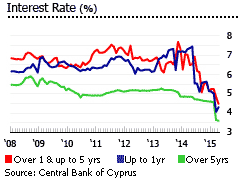
The ECB key rate was currently at an all-time low of 0.05%. The key rate is expected to remain at that level in the foreseeable future.
In the past years, banks in Cyprus have been slow to respond to ECB interest rate cuts, and there was a large margin between the Central Bank key rate and their interest rates. That was because there is little inter-bank lending, so banks rely on customer deposits for funding. Many banks pay high rates to attract deposits, according to finance minister Makis Keravnos.
The market is becoming more sensitive to interest rate shocks. Variable-rate mortgages now account for about 98% of all housing loans in Cyprus.
Sluggish mortgage market
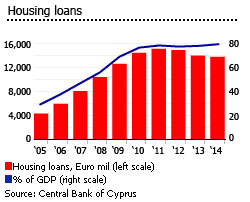
From 29.4% of GDP in 2005, the mortgage market grew sharply to about 76% of GDP in 2010. However, the mortgage market slowed since then. The mortgage market expanded to just about 78.7% of GDP in 2014, from 77.7% of GDP in 2011.
In May 2015, total outstanding housing loans were down by 4.9% y-o-y to €12.96 billion (US$14.4 billion), according to the Central Bank of Cyprus. Total advances to domestic residents consisted of about 87% of total housing loans. The remaining 13% of loans were drawn by Euro area residents and those from the rest of the world. The amount of housing loans peaked in 2011when it reached €15.14 billion (US$16.83 billion).
Rents falling, but yields steady
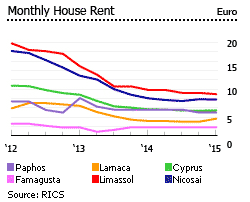
Across Cyprus, monthly rents dropped by 3.9% for flats with rents up to €324 (US$360), and by 1.1% for houses with rents up to €536 (US$596), during the year to Q1 2015, based on figures from RICS.
By major urban centers:
- In Nicosia, the average monthly house rent fell by 1.2% y-o-y to €594 (US$660) in Q1 2015.
- In Limassol, the average monthly house rent fell by 3.6% y-o-y to €623 (US$692) in Q1 2015.
- In Larnaca, rents for houses also dropped 3% during the year to Q1 2015, to an average of €524 (US$582).
- In Paphos, the average monthly house rent rose by 2.5% y-o-y to €491 (US$546) over the same period.
- In Famagusta, monthly house rent remained unchanged at an average of €445 (US$495) over the same period.
Average gross yields in Cyprus stood at 3.8% for apartments, 2% for houses during the first quarter of 2015, almost unchanged from a year earlier, according to RICS. Limassol recorded the highest gross yields for both apartments and houses, of 4.2% and 2.4%, respectively.
Cyprus: global specialist in property frauds
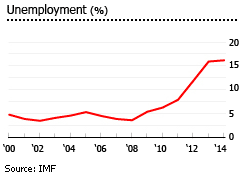
Property frauds in Cyprus are a huge problem for expat home owners, but also for developers, banks, and the government.
Many buyers have lost their homes after the developer went bankrupt, despite having paid in full.
Developers tend to keep the title deeds, neglecting to inform house-buyers that their title deeds will be withheld for an unspecified time, or that the land on which their property is built has been mortgaged by the developer. The bank which holds the title deed as collateral has the right to foreclose, but, under normal circumstances, it may take a bank between 9 to 12 years to obtain control over the property. So banks extend and pretend, until the developer goes broke.
Between January 2005 and June 2008 a total of 37,769 overseas buyers purchased 29,949 properties for which Title Deeds had yet to be transferred, according to the Cyprus Department Land Registry report published in October 2008. This figure of 29,949 included properties for which Title Deeds had yet to be issued, plus those whose Title Deeds were in the process of being issued. During the same three and a half year period, 4,440 properties were transferred to 5,988 overseas buyers.
“Some cases have involved ‘double selling’ fraud whereby the developer sells a property to Party A, fails to lodge the contract with the Land Registry, and then sells it again to Party B (possibly for a higher price) but fails to reimburse Party A,” says Alan Waring, an international risk management consultant.
The Land Registry has not issued a report on Title Deeds since 2008. But the number of pending applications for Title Deeds is down to 20,000 as of August 2014, according to the Land and Surveys Department.
A new directive on mortgage credit was adopted on January 28, 2014, by the Economic and Financial Affairs Council. Its new rules will address some of the amazing problems in the Cyprus market, such as insufficient pre-contractual information, irresponsible lending and borrowing, and misleading advertising and marketing. The directive establishes regulatory and supervisory principles for credit intermediaries, and provisions to regulate and supervise non-credit institutions.
It sets out conditions for ensuring professionalism amongst creditors and credit intermediaries; principles for marketing and advertising; obligations relating to pre-contractual information; requirements for information on the borrowing rate; and requirements to check the consumer’s creditworthiness; and disclosure obligations for the consumer.
However in the medium-term, the risks of developer defaults and home repossessions can only increase, given Cyprus´ worsening economic outlook. Developer debt has doubled in the last three years, and now stands at nearly €6 billion (US$ 8.22 billion).
Economy hamstrung by massive non-performing loans
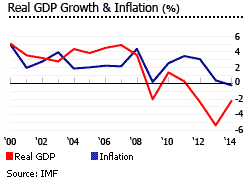
Cyprus’ economy contracted about 2% in 2009, mainly due to the adverse impact of the global crisis. This was in sharp contrast to the robust annual average growth rate of 4.25% from 2004 to 2008. After registering anaemic growth rates of 1.4% in 2010 and 0.26% in 2011, the economy shrank again by 2.4% in 2012.
The economy remained depressed, contracting by a huge 5.4% in 2013 and by another 2.3% in 2014, based on IMF figures.
Cyprus faces enormous economic problems. Non-performing loans (NPL) are a key issue. NPLs amounted to €24.1 billion (US$26.78 billion) or 147% of GDP in 2013. Many NPLs are in the construction sector, consisting of about 20% of all NPLs. In March 2015, NPLs surged by 14.5% to €27.6 billion (US$30.67) from almost two years ago.
The IMF has identified these NPLs as a “key challenge” to the economy and called on legislators to put in place a “strong legal framework to facilitate foreclosures”, arguing that facilitating asset seizures to be an effective remedy for rising NPLs.
The Bank of Cyprus (BoC) is on the edge of setting up a separate “development bank” to deal with mortgaged properties. The move, according to BoC Chairman Christis Hassapis, is not intended to split the bank into a “good” and a “bad” bank. The aim is to set up a new bank to deal with property development and handle NPLs. The government is now holding talks with the European Investment Bank (EIB) which plans to invest at least €100 million annually in Cyprus.
Unemployment reached a record 16.17% in 2014, according to the IMF. Jobless rate is expected to decline slightly to 15.9% this year.